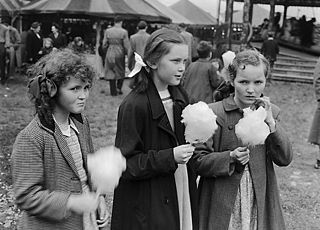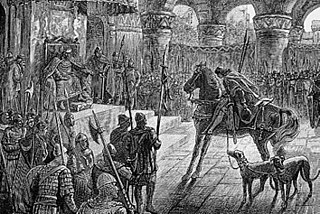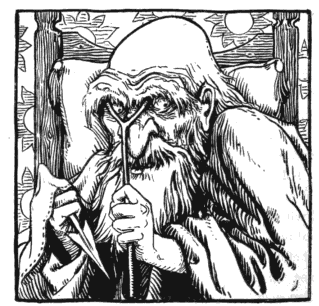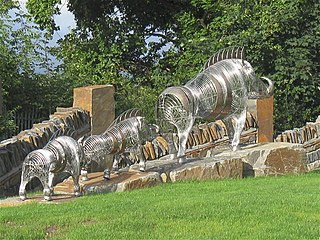In Welsh mythology, Gwythyr ap Greidawl was a rival of Gwyn ap Nudd, a deity connected with the otherworld. In the Middle Welsh prose tale Culhwch ac Olwen , he is named as a member of Arthur's retinue and takes part in the quest to win the hand of Olwen for Arthur's cousin, Culhwch. Gwthyr would join Arthur on a journey to Pennant Gofid in Hell to retrieve the blood of the witch Orddu. His father is Greidawl Galldonyd, a fellow knight in Arthur's court. [1] In Bonedd yr Arwyr, his genealogy is given as Gwythyr son of Greidawl the son of Enfael the son of Deigyr the son of Dyfnwal the son of Ednyfed the son of Maxen the son of Llywelyn. [2] The Welsh Triads name him as the father of Arthur's second wife, also named Gwenhwyfar. [2]

Welsh mythology consists of both folk traditions developed in Wales, and traditions developed by the Celtic Britons elsewhere before the end of the first millennium. Like most predominately oral societies found in the prehistoric Britain, Welsh mythology and history was recorded orally by specialists such as druids. This oral record has been lost or altered as result of outside contact and invasion over the years. Much of this altered mythology and history are preserved in medieval Welsh manuscripts which include the Red Book of Hergest, the White Book of Rhydderch, the Book of Aneirin and the Book of Taliesin. Other works connected to Welsh mythology include the ninth century Latin historical compilation Historia Brittonum and Geoffrey of Monmouth's twelfth-century Latin chronicle, Historia Regum Britanniae as well as later folklore such as the 1908 The Welsh Fairy Book by William Jenkyn Thomas.

Gwyn ap Nudd is a Welsh mythological figure, the king of the Tylwyth Teg or "fair folk" and ruler of the Welsh Otherworld, Annwn, and whose name means “white son of Nudd”. Described later on as a great warrior with a "blackened face", Gwyn is intimately associated with the otherworld in medieval Welsh literature, and is associated with the international tradition of the Wild Hunt.
A god is a male deity, in contrast with a goddess, a female deity. While the term "goddess" specifically refers to a female deity, the plural "gods" can be applied to deities collectively, regardless of gender. The Greek and Roman pantheons were ruled by Zeus and Jupiter.
Sometime before the main events of Culhwch and Olwen, Gwythyr was engaged to marry Creiddylad, daughter of Lludd, who was stolen from him by her brother, Gwyn ap Nudd. In a violent battle, Gwyn defeated his rival, kept Creiddylad and took a number of Gwythyr's chieftains prisoner. When Arthur heard of this, he forced Gwyn to release the noblemen and made peace between the two adversaries.
Creiddylad, daughter of King Lludd, is a minor character in the early medieval Welsh Arthurian tale Culhwch ac Olwen.
Every Calan Mai, the two would fight over Creiddylad, until a battle on Judgment Day, in which the victor would keep her forever. Their rivalry has been taken to represent the contest between summer and winter and is a variant of the Holly King myth. [3]

Calan Mai or Calan Haf is a May Day holiday of Wales held on 1 May. Celebrations start on the evening before, known as May Eve, with bonfires; as with Calan Gaeaf or November 1, the night before is considered an Ysbrydnos or "spirit night" when spirits are out and about divination is possible. The tradition of lighting bonfires celebrating this occasion happened annually in South Wales until the middle of the 19th century.
The Holly King is a speculative archetype of modern studies of folklore and mythology which has been popularized in some Neopagan religions. In his book The White Goddess, the author Robert Graves proposed that the mythological figure of the Holly King represents one half of the year, while the other is personified by his counterpart and adversary the Oak King: the two battle endlessly as the seasons turn. At Midsummer the Oak King is at the height of his strength, while the Holly King is at his weakest. The Holly King begins to regain his power, and at the Autumn Equinox, the tables finally turn in the Holly King's favor; his strength peaks at Midwinter. Graves identified a number of paired hero-figures which he believes are variants of this myth, including Lleu Llaw Gyffes and Gronw Pebr, Gwyn and Gwythr, Lugh and Balor, Balan and Balin, Gawain and the Green Knight, the robin and the wren, and even Jesus and John the Baptist.







